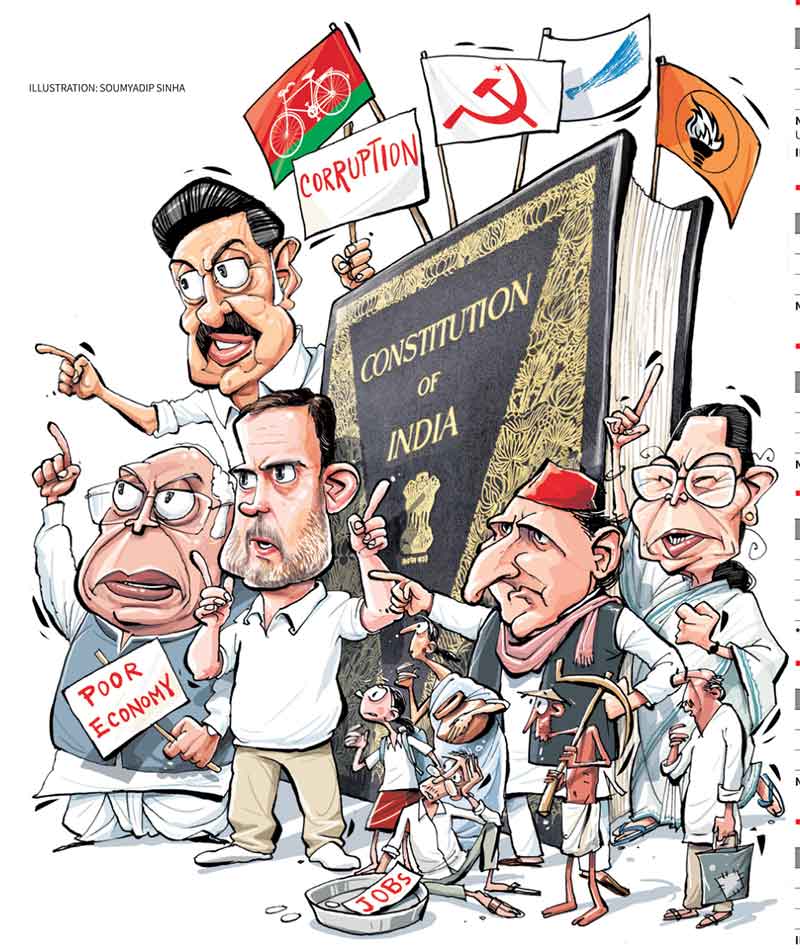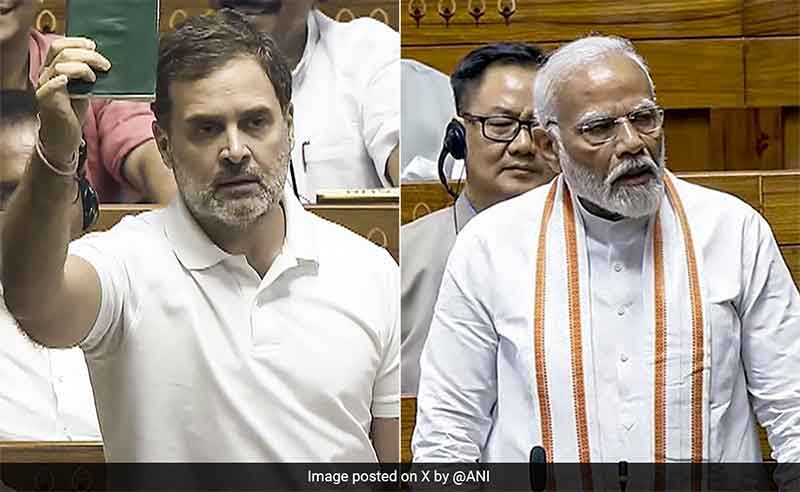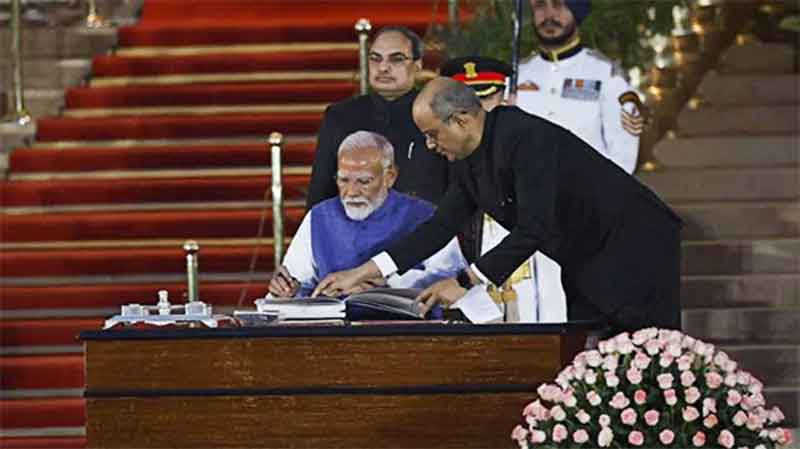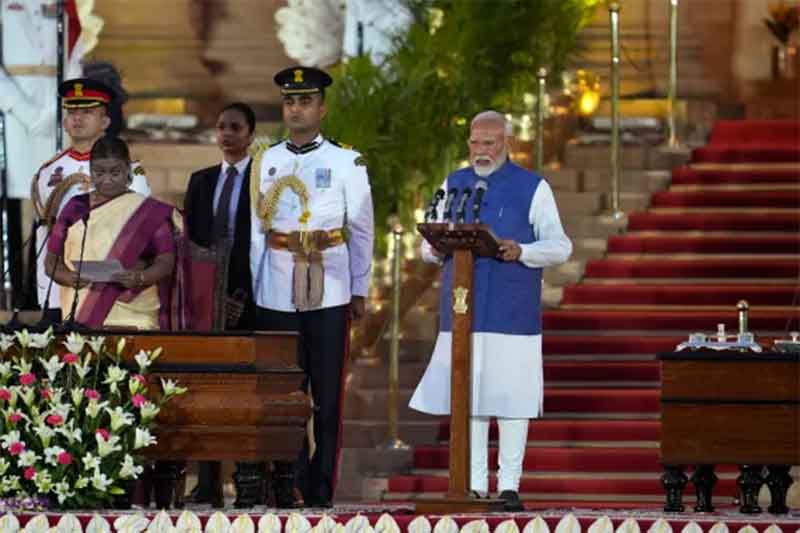
A moot political question is ‘which will survive NDA or INDIA ‘alliance’? In Indian Constitution was not mentioned about ‘coalitions. It might not be “unconstitutional,” nevertheless. Referred to as Raja Dharma or Dharma, this constitutional term refers to the legal system or, alternatively, to “the Ram Rajya,” or good government.
A new “law” was created by the Constitution as a result of the deft political maneuvering of Dal and Badal, which turned into a “Leela” (a play). Some politicians filed Writs or PILs to challenge it in the Supreme Court or the High Court. There are several rulings that create extremely complicated and complex “law.” The Tenth Schedule of the Constitution, often known as the “Anti Defection law (Dal Badal Virodhi Kanoon),” prohibits elected members of parliament from defecting from one party to another if they are deemed to be “Dal.” [The anti-defection legislation addresses instances in which (a) political party members, (b) independent members, and (c) nominated members desert in the legislative of a state or the parliament. The law permits lawmakers to switch parties under certain conditions without running the danger of losing their seats]
Sanghatan Badal
Due to political changes and defections in spite of Anti-defection law, new Governments and parties are emerging necessitating coalitions of two or group of parties. The pre-election coalitions appear to be ‘legal’. A party may break loyalty from one alliance and form new group with the support of Centre. There is no law to prohibit any the alliance of two or more political parties. They can join any Sanghatan Badal or break. Hence defection from one to other coalitions are resulting in overnight coming up the Governments, installed by different political groups. The Tenth Schedule is legally possible to prohibit defection, but there is no ‘coalition’ defection. MPs had no time to frame an anti-defection of ‘alliance’ law. Parliament may not create an Eleventh Schedule!
There is a moral bond with a pre-election coalition, but in post-election it is happening as temporary arrangement. An explicit agreement including seat sharing between two or more political parties prior to the start of elections is known as an alliance or coalition. This is only an arrangement whereby the alliance members split the total number of seats among themselves and nominate candidates; it is not a legally binding agreement. It is not permitted for candidates from one political party to run against those from another. There is neither ethical or legal support to any such ‘arrangements’, which are totally opportunistic without any basis of principles or theories.
Bonding with TDP, Jana Sena and BJP
For example, TDP, Jana Sena and BJP combine in 2014 resulted in Governments led by Chandrababu Naidu. But the ‘pre-poll’ was broken, one fought with the others. Again, a new ‘pre-poll’ alliance is arranged in 2024. Recently, Telugu Desham legislators 135 (of Chandrababu Naidu), BJP 8 (under the leadership of Modi), and Jena Sena 21 (led by Pawan Kalyan) contested together all 175 seats in Andhra Pradesh, while this alliance fought with YSRCP but confined to win 11 seats. (In Lok Sabha TDP won 16 out of the 25 seats, Jana Sena 2, BJP won 3 of six, and YSRCP got 4 in Lok Sabha.)
What binds the alliance?
What binds a ruling alliance or another alliance called INDIA? There may be based on a ‘memo of understanding’. It might be referred to as an implicit agreement, which is unenforceable in court of law. Is there a fixed term? If they persist as NDA partners for the whole five-year legal term, it may result in a stable administration.
Neither NDA nor INDIA are morally or legally bound? Whether this ‘Memo of Understanding’ between all the partners of NDA in ruling party or INDIA alliance with opposition front survive for complete 5 years?
The matter at hand is to whether the Prime Minister’s NDA or Opposition INDIA took any action to safeguard the “bond” in spite of the agreement, if any. Whether this or that alliance shaky or strong? One is called ‘right’ wing alliance while the other is centre to left wing and left wing is shaky or strong?
The power of NDA
Since its founding in 1998, the NDA has grown significantly in power in India, where it presently governs 19 Indian states as well as one Union territory. Now the chairman of NDA is Amit Shah (Union Cabinet Minister) while the Lok Sabha leader is Prime Minister Narendra Modi, Piyush Goyal (Union Cabinet Minister) is the leader of Rajya Sabha unless the leader is changed for any reason. (Union Cabinet Minister). Its first chairman was then Prime Minister of India Atal Bihari Vajpayee. L. K. Advani, the former Deputy Prime Minister, took over as chairman in 2004 and served until 2014. The NDA lost 60 seats in the 2024 general election, the first Coalition in over 10 years. Recently on 5 June, Modi confirmed the support of 293 MPs to Droupadi Murmu, the President of India. This marked Modi’s third term as Prime Minister and his first time heading a coalition government, with the Telugu Desam Party of Andhra Pradesh and Janata Dal (United) of Bihar emerging as two main allies.
Subscribe to Our Newsletter
Get the latest CounterCurrents updates delivered straight to your inbox.
The alliance led by the BJP, included several regional parties, like the Samata Party and the AIADMK, as well as Shiv Sena which was the only member which shared the Hindutva ideology of the BJP. But Shiv Sena broke away from the alliance in 2019 to join the Maha Vikas Aghadi with Congress and the NCP. It was then split into SS and MVA of Sharad Pawar, to create a new alliance engineered by BJP in Maharashtra. The Samata Party broke away from the alliance in 2003 after the formation of Janta Dal (United). After, outside support from the Telugu Desam Party, helped Atal Bihari Vajpayee to return as prime minister. The BJP was previously the only party in power in Jharkhand and Delhi during the alliance’s journey. It has also had coalition and alliance government authority over Jammu and Kashmir, Punjab, Odisha, and Andhra Pradesh. Three states, nevertheless, have never seen the NDA in power: West Bengal, Kerala, and Telangana (when the BJP controlled United Andhra Pradesh in coalition with the TDP from 1999 to 2004).
Recently, governments have changed at the drop of a hat amid “developments” that lasted overnight. (Combines to mean that when you act on impulse, you act without giving it any thought). There can be other political variables at play right now that lead to new partnerships as well. The leaders of the major parties began to receive calls to quit the NDA and join other parties or another alliance such as INDIA. Whether a coalition is helpful or harmful for the stability of the country, no alliance is morally obligated to join it.
Dr. M Sridhar Acharyulu, LL.D., MCJ., Professor, School of Law, Mahindra University, Hyderabad















































